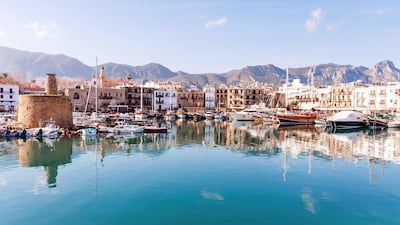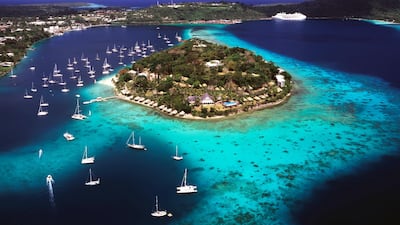For almost four decades, citizenship by investment schemes have been the ticket to a new nationality — at a hefty cost.
However, with some schemes coming in as high as almost $12.5 million (Dh45.9m), cheaper programmes across Europe and North America - and even the Caribbean and the Pacific - are increasing in popularity, according to analysts.
Six in 10 residents wish to relocate from the Emirates to a destination other than their home country, according to a June YouGov survey conducted for immigration company Vazir Group, with Canada topping the list, followed by the EU and US. Education for their children, a better standard of living and visa-free travel from a strong second passport were key drivers for relocating, the survey found.
Citizenship advisory Henley & Partners, which runs an annual index of the most powerful passports, says the passport strength of countries with citizenship by investment (CBI) programmes is one of the index's success stories, citing Malta (the index's eighth most powerful passport) and Montenegro (43rd).
But American Dream’s chief executive, Stuart Ferguson, says there has been a “dramatic” rise in the number of applicants for the US scheme from the Middle East, with GCC approvals rising six-fold year-on-year in 2018 and 54 UAE residents approved. High-net worth individuals in the UAE considering a second citizenship are not well enough informed about the US investor programme, he believes.
“The UAE has always been an important market for second citizenship providers because of the high international immigrant population and the number of people in a position to afford it,” Mr Ferguson says. “Yet much of the dialogue here is still around Caribbean and European programmes. There is a lack of information about the United States.”
Here are five of the the most-expensive CBI schemes today in terms of investment cost, ranked from lowest to highest.
5. St Kitts & Nevis: from $235,000
Caribbean countries including Dominica, Antigua and Barbuda and St Kitts and Nevis reduced the cost of entry of their CBI schemes last year, to help finance the cost of damage by Hurricanes Maria and Irma - and none require residency. St Kitts and Nevis is the world’s oldest CBI programme, established in 1984 after it gained independence from the UK. The country earned some 14 per cent of its gross domestic product from the scheme in 2014, the International Monetary Fund estimates.
Tamara O’Flaherty is CBI programme manager at Naseba, which has offered a full-ownership investment in the Tamarind Cove Marina project in St Kitts and Nevis, to 100 applicants so far. She says while Naseba’s older client base uses second passports “as a means of retirement”, most applicants are now interested in its “travel convenience”. The type of applicant is changing, she says, from “wealthy 50- 70-year-olds” to “affluent 30- to 40-year-old professionals”, often from markets such as South Africa and Nigeria.
Cost: A government donation of $150,000 for a single applicant, or a real estate investment from $200,000 (resaleable after seven years), plus $35,000 fees – or $400,000 to buy a property that can be sold after five years. Costs are similar for Antigua & Barbuda, slightly cheaper in Dominica and slightly more expensive in Grenada.
Criteria: Joint real estate investments cannot be sold for seven years (or five for an individual investment over $400,000). For families, donations rise by $20,000 for each dependent over the age of 16.
Benefits: The country has instituted a 60-day accelerated application process. Income and capital gains are tax-free. Citizens are allowed to hold multiple nationalities and gain visa-free access to 152 countries.
4. US: from $900,000
The US employment-based fifth preference category (or EB-5 visa) was created in 1990 to allow immigrant investors to become lawful permanent residents — that is, green card holders. They must finance a business that will employ at least 10 full-time American workers. Investing in a targeted employment area (TEA) — generally an area that is rural or high in unemployment, such as Arlington in Illinois — to keep the cost down to $900,000; otherwise the investment required shoots up to $1.8m, a figure which has increased 80 per cent this year.
Cost: This rises in November from $500,000 to $900,000, plus fees.
Criteria: EB-5 grants a two-year conditional green card for yourself and your spouse and unmarried children under the age of 21. You can then become a permanent green card holder and, after a further three years, you are eligible to apply for naturalisation as a US citizen. During those five years, you must have been present in the US for at least half the time without any single absence of more than 180 days.
Benefits: You are free to live and work anywhere in the US and your children can access a US education. An American passport offers visa-free access to 183 countries.
3. Canada: $905,000
Although Canada closed its federal investment immigration scheme five years ago, regional versions continue. Dubai’s Vazir Group says its Canada programmes - either to purchase a business in the Eastern Provinces or to invest in Quebec – are its most popular, with most demand from Indians. In a survey it ran with YouGov in June, 58 per cent of respondents said they would consider moving to Canada.
Cost: For Quebec, C$1.2m (Dh3.3m), with no interest for five years, after which the full amount will be refunded and is guaranteed by the government. Or purchase an Eastern Provinces business for C$150,000 to C$1m.
Criteria: The entire family must complete and pass Canada's medical, language and security tests. Minimum net worth criteria depending on region (C$2m or $1.51m in Quebec) plus relevant business experience.
Benefits: Child support, free education (plus subsidised university) and free healthcare in most provinces. Expect permanent residency within six-to-nine months or, in Quebec, in one-to-four years. You can then apply for a Canadian passport after living three of five years in Canada, which offers visa-free access to 183 countries.
2. Cyprus: $2.4m
An EU passport is highly attractive, giving that it provides successful applicants the right to live, work and study in all member countries. Ola Degteva, research director at Expatra.com, a website providing overseas retirement resources, says the leaders in CBI are Spain, Cyprus and Portugal - but warns there may be "a lengthy wait".
A Spanish passport takes “a lot of time and not so much money” - a property investment of €500,000 (Dh2.03m)) will give a five-year renewable golden visa. After five years it is possible to gain permanent residency and, after 10 years, citizenship. A Portuguese passport can be procured for as little as €350,000 if put into a renovation project, resulting in a five-year golden visa and a passport a year later. “However, if you are in a hurry, Cyprus is the best deal for you,” she says. “You can get a Cypriot passport in under six months.”
Cost: €2.15m (Dh8.74m)
Criteria: You must make a €2m investment plus €150,000 in donations as well as purchasing a Cypriot residence of at least €500,000 or $554,160 (which can be part or all of the €2m investment).
Benefits: The whole family benefits, with citizenship passed to future generations. The right of free movement within the EU and visa-free access to 172 countries.
1. UK: from $2.5m up to $12.47m
The UK’s Tier 1 Investor Visa requires an investment of at least £2m (Dh9.16m)) for five years in the UK – which cannot be offshore. The applicant (plus spouse and children under the age of 18) will receive a visa initially for three years and four months and can then apply for a two-year extension of stay. After five years of residence, they can apply for indefinite leave to remain and, a year later, be eligible to apply for UK citizenship – but must not be absent from the country for more than three months a year to do so.
The more money you have, the quicker you can secure your British passport. A £5m investment fast-tracks the five years to three, and £10m reduces it to two years. These costs come with fees on top, including a healthcare surcharge of £400 per person per year.
Cost: £2m, £5m or £10m plus fees
Criteria: You must provide evidence of the required investment funds (and their source) and criminal record certificates and have a UK bank account. You must also remain resident for all but 90 days a year (or 450 days in the previous five years).
Benefits: Free healthcare and education with low university fees and — for now — the right of free movement within the EU. A British passport gives visa-free access to 183 countries, although that figure may reduce after Brexit.







